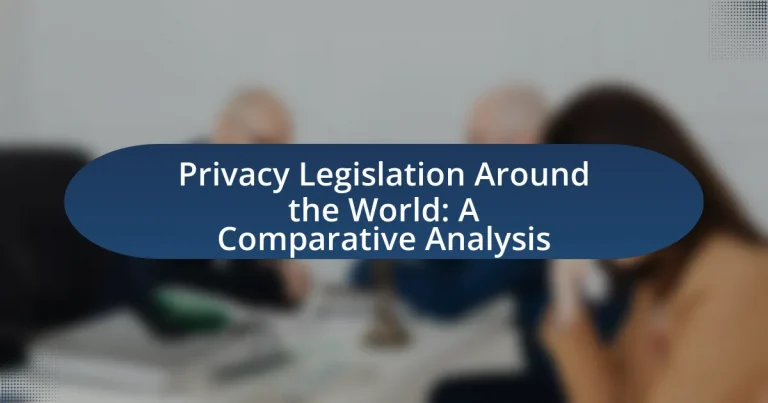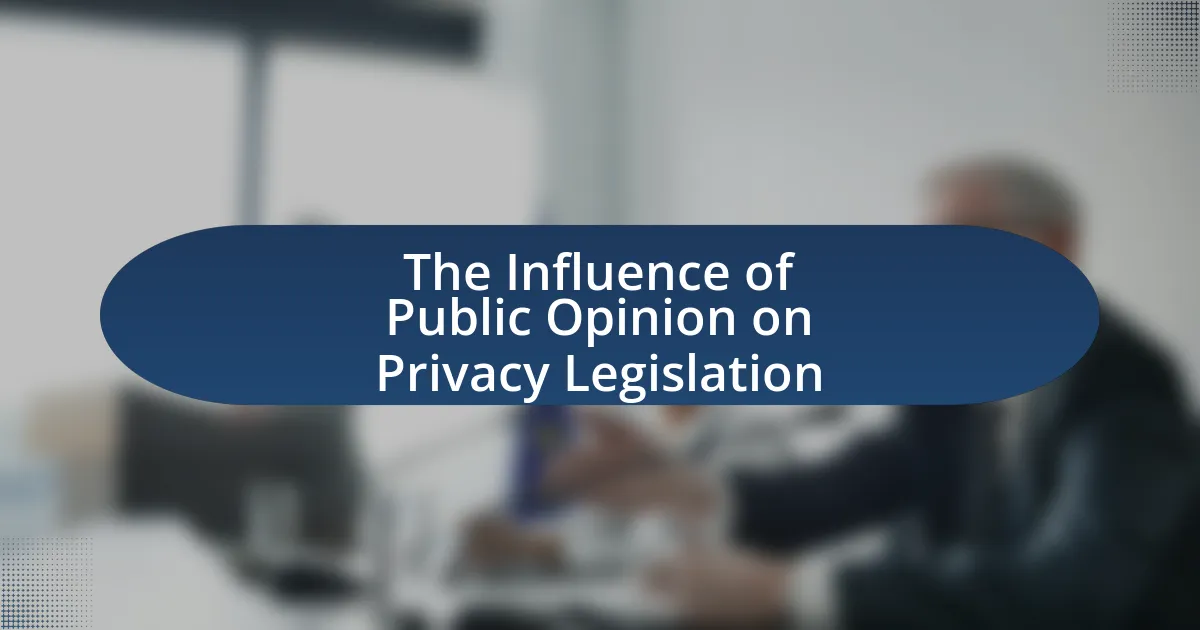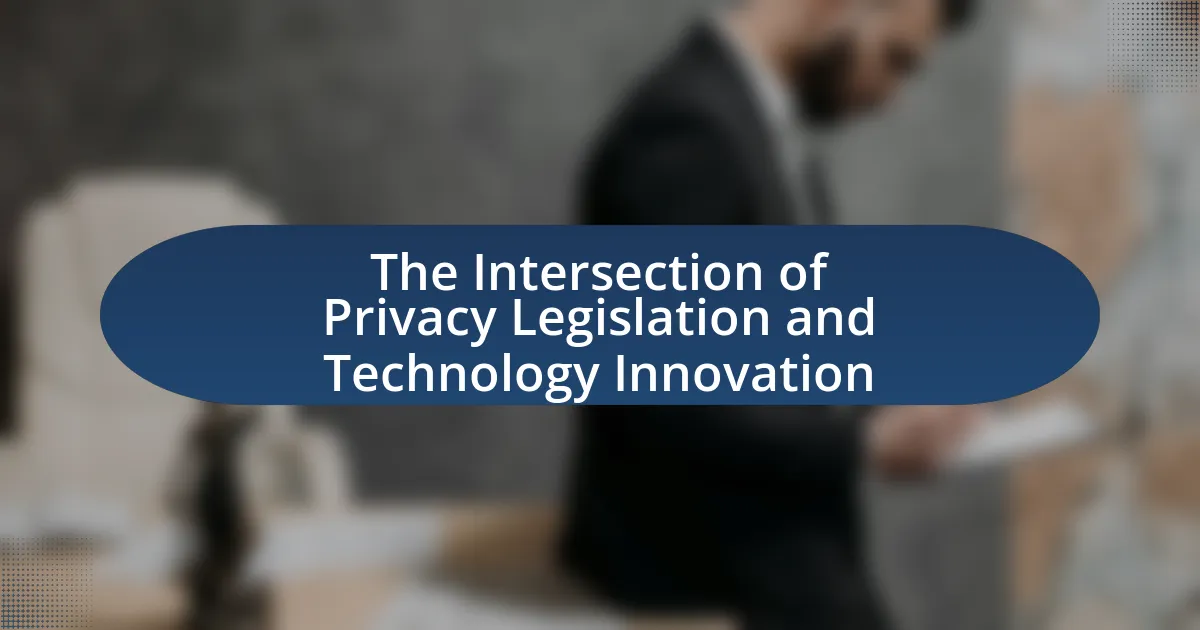Privacy legislation around the world refers to various laws and regulations aimed at protecting individuals’ personal information and data. Key frameworks include the General Data Protection Regulation (GDPR) in the European Union, the California Consumer Privacy Act (CCPA) in the United States, and similar laws in Canada and Brazil. The article examines how privacy legislation varies across countries, the underlying principles such as consent and transparency, and the cultural influences that shape these laws. It also highlights the importance of privacy legislation in the digital age, the risks individuals face without adequate protections, and the impact on businesses. Additionally, the article discusses trends, challenges, and best practices for compliance in the evolving landscape of global privacy legislation.
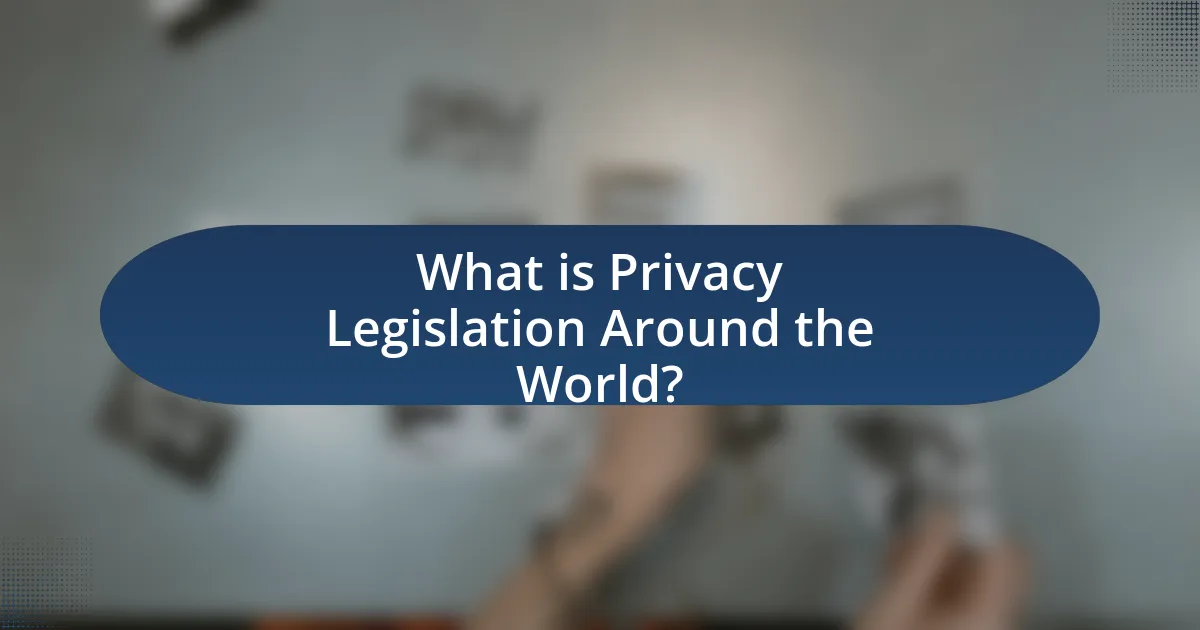
What is Privacy Legislation Around the World?
Privacy legislation around the world encompasses various laws and regulations designed to protect individuals’ personal information and data. For instance, the General Data Protection Regulation (GDPR) in the European Union sets stringent requirements for data protection and privacy, affecting any organization that processes the personal data of EU citizens. Similarly, the California Consumer Privacy Act (CCPA) in the United States grants California residents specific rights regarding their personal information, including the right to know what data is collected and the right to request deletion. Other countries, such as Canada with its Personal Information Protection and Electronic Documents Act (PIPEDA) and Brazil with the Lei Geral de Proteção de Dados (LGPD), have also established comprehensive privacy frameworks. These laws reflect a growing global trend towards enhancing privacy rights and data protection standards.
How does privacy legislation vary across different countries?
Privacy legislation varies significantly across different countries, reflecting diverse cultural, legal, and political contexts. For instance, the European Union’s General Data Protection Regulation (GDPR) establishes stringent data protection standards, emphasizing individual rights and consent, while countries like the United States adopt a more sectoral approach, with laws such as the California Consumer Privacy Act (CCPA) focusing on specific industries rather than comprehensive national regulations. In contrast, countries like China implement strict state control over data, prioritizing national security over individual privacy rights. These differences illustrate how privacy legislation is shaped by each country’s values and priorities, impacting how personal data is managed and protected globally.
What are the key principles underlying privacy laws globally?
The key principles underlying privacy laws globally include data minimization, purpose limitation, consent, transparency, and accountability. Data minimization mandates that only necessary personal data should be collected and processed, reducing the risk of misuse. Purpose limitation requires that data be collected for specific, legitimate purposes and not further processed in a manner incompatible with those purposes. Consent emphasizes that individuals must give informed and explicit permission for their data to be processed. Transparency involves clear communication to individuals about how their data will be used, fostering trust. Accountability holds organizations responsible for complying with privacy laws and protecting personal data. These principles are reflected in various international frameworks, such as the General Data Protection Regulation (GDPR) in the European Union, which enshrines these concepts into law, demonstrating their global relevance and application.
How do cultural differences influence privacy legislation?
Cultural differences significantly influence privacy legislation by shaping societal attitudes toward individual rights and state authority. For instance, in collectivist cultures, such as those in many Asian countries, privacy may be viewed as secondary to community welfare, leading to more permissive data-sharing laws. Conversely, in individualistic cultures like those in Europe and North America, there is a stronger emphasis on personal privacy rights, resulting in stricter regulations such as the General Data Protection Regulation (GDPR) in the European Union. These cultural perspectives directly affect how privacy is legislated, as seen in varying approaches to consent, data protection, and surveillance practices across different regions.
Why is privacy legislation important in today’s digital age?
Privacy legislation is crucial in today’s digital age because it protects individuals’ personal data from misuse and exploitation. With the exponential growth of technology and data collection, individuals face increased risks of identity theft, surveillance, and unauthorized data sharing. For instance, the General Data Protection Regulation (GDPR) implemented in the European Union has set a global standard for data protection, mandating that organizations obtain explicit consent before processing personal data. This legislation has led to a significant increase in awareness regarding data privacy rights, with 79% of consumers expressing concern about how their data is used, according to a 2021 survey by the International Association of Privacy Professionals. Thus, privacy legislation not only safeguards individual rights but also fosters trust in digital services, which is essential for the continued growth of the digital economy.
What risks do individuals face without adequate privacy protections?
Individuals without adequate privacy protections face significant risks, including identity theft, data breaches, and unauthorized surveillance. Identity theft can lead to financial loss and damage to credit ratings, as personal information is exploited for fraudulent activities. Data breaches expose sensitive information, resulting in potential misuse by cybercriminals, which can affect individuals’ financial security and personal safety. Unauthorized surveillance infringes on personal freedoms and can lead to a chilling effect on free expression, as individuals may alter their behavior due to fear of being monitored. According to a report by the Identity Theft Resource Center, there were over 1,100 data breaches in the United States in 2020, affecting millions of individuals and highlighting the critical need for robust privacy protections.
How does privacy legislation impact businesses and organizations?
Privacy legislation significantly impacts businesses and organizations by imposing strict regulations on how they collect, store, and process personal data. Compliance with laws such as the General Data Protection Regulation (GDPR) in Europe requires organizations to implement robust data protection measures, which can lead to increased operational costs and necessitate changes in business practices. For instance, a study by the International Association of Privacy Professionals (IAPP) found that 60% of organizations reported increased compliance costs due to GDPR, affecting their profitability and resource allocation. Additionally, non-compliance can result in substantial fines, as seen when British Airways was fined £20 million for a data breach, highlighting the financial risks associated with inadequate privacy practices.
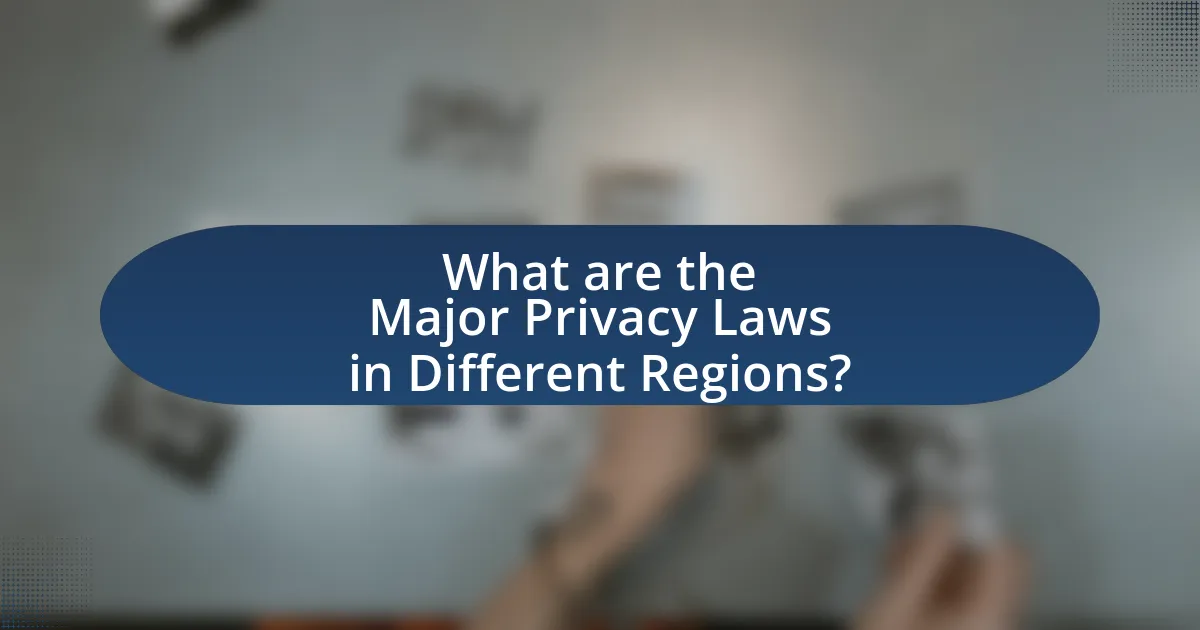
What are the Major Privacy Laws in Different Regions?
The major privacy laws in different regions include the General Data Protection Regulation (GDPR) in the European Union, the California Consumer Privacy Act (CCPA) in California, the Personal Information Protection and Electronic Documents Act (PIPEDA) in Canada, and the Lei Geral de Proteção de Dados (LGPD) in Brazil. The GDPR, enacted in 2018, sets a high standard for data protection and privacy rights for individuals within the EU, imposing strict requirements on organizations handling personal data. The CCPA, effective from 2020, grants California residents specific rights regarding their personal information, including the right to know what data is collected and the right to opt-out of its sale. PIPEDA, which came into force in 2000, governs how private sector organizations collect, use, and disclose personal information in Canada. The LGPD, implemented in 2020, establishes comprehensive data protection regulations in Brazil, similar to the GDPR, emphasizing the protection of personal data and privacy rights. These laws reflect a growing global emphasis on data privacy and the protection of individual rights.
What are the key features of the General Data Protection Regulation (GDPR)?
The key features of the General Data Protection Regulation (GDPR) include enhanced data protection rights for individuals, strict requirements for data processing, and significant penalties for non-compliance. GDPR grants individuals rights such as the right to access their data, the right to rectification, the right to erasure (also known as the right to be forgotten), and the right to data portability. Organizations must obtain explicit consent from individuals before processing their personal data and must implement measures to ensure data security. Non-compliance can result in fines up to 4% of annual global turnover or €20 million, whichever is higher, demonstrating the regulation’s stringent enforcement mechanisms.
How does GDPR enforce data protection rights for individuals?
GDPR enforces data protection rights for individuals through a comprehensive framework that mandates organizations to uphold specific rights, such as the right to access, the right to rectification, and the right to erasure. These rights empower individuals to control their personal data, ensuring transparency and accountability from data controllers and processors. For instance, Article 15 of GDPR grants individuals the right to obtain confirmation of whether their personal data is being processed, along with access to that data. Additionally, non-compliance with GDPR can result in significant fines, up to 4% of annual global turnover or €20 million, whichever is higher, as stipulated in Article 83. This financial penalty serves as a strong deterrent, reinforcing the importance of adhering to data protection rights.
What penalties exist for non-compliance with GDPR?
Non-compliance with GDPR can result in significant penalties, including fines of up to €20 million or 4% of the annual global turnover, whichever is higher. These penalties are enforced by data protection authorities in EU member states, which have the authority to investigate and impose sanctions for violations. For instance, in 2021, Amazon was fined €746 million by Luxembourg’s data protection authority for GDPR violations, illustrating the financial repercussions organizations may face for non-compliance.
How do privacy laws in the United States differ from those in Europe?
Privacy laws in the United States differ from those in Europe primarily in their approach to data protection and individual rights. The U.S. employs a sectoral approach, meaning that privacy regulations are fragmented and vary by industry, such as healthcare (HIPAA) and finance (GLBA), rather than a comprehensive framework. In contrast, Europe follows a unified approach under the General Data Protection Regulation (GDPR), which provides broad protections for personal data and grants individuals extensive rights, including the right to access, rectify, and erase their data. The GDPR also imposes strict consent requirements and significant penalties for non-compliance, unlike U.S. laws, which often lack such stringent measures.
What are the main federal privacy laws in the U.S.?
The main federal privacy laws in the U.S. are the Health Insurance Portability and Accountability Act (HIPAA), the Children’s Online Privacy Protection Act (COPPA), and the Gramm-Leach-Bliley Act (GLBA). HIPAA protects the privacy of individuals’ medical records and other personal health information, establishing national standards for electronic health care transactions. COPPA imposes requirements on online services directed at children under 13, ensuring parental consent for data collection. GLBA mandates financial institutions to explain their information-sharing practices to customers and to safeguard sensitive data. These laws collectively address various aspects of privacy across health, children’s online activities, and financial services.
How do state-level privacy laws complement or conflict with federal regulations?
State-level privacy laws often complement federal regulations by providing additional protections that enhance consumer privacy rights, while they can also conflict by imposing stricter requirements than federal standards. For instance, California’s Consumer Privacy Act (CCPA) offers broader consumer rights compared to the federal level, allowing residents to opt-out of data selling, which aligns with the federal push for consumer protection but goes further in specific areas. Conversely, conflicts arise when state laws create compliance challenges for businesses operating nationally, as seen with varying definitions of personal data and differing enforcement mechanisms. These dynamics illustrate the complex interplay between state and federal privacy frameworks, where state laws can either fill gaps in federal protections or create legal inconsistencies that complicate compliance for businesses.
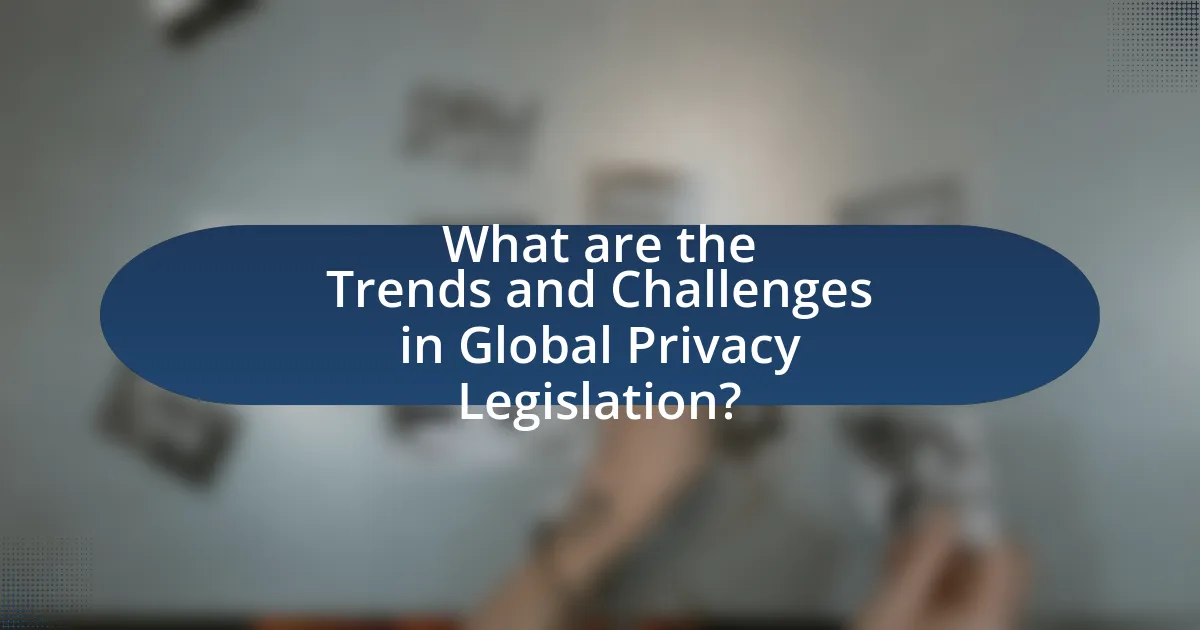
What are the Trends and Challenges in Global Privacy Legislation?
Trends in global privacy legislation include the increasing adoption of comprehensive data protection laws, such as the General Data Protection Regulation (GDPR) in Europe, which has influenced similar frameworks worldwide. Countries like Brazil and India are implementing their own data protection regulations, reflecting a global shift towards stronger privacy rights. Challenges include the complexity of compliance for multinational corporations, as differing regulations across jurisdictions create legal ambiguities and increased operational costs. Additionally, the rapid pace of technological advancement often outstrips legislative processes, leading to gaps in regulation that can compromise consumer privacy.
How is technology shaping the future of privacy legislation?
Technology is significantly shaping the future of privacy legislation by driving the need for more robust data protection frameworks. The rise of digital platforms and the proliferation of personal data collection have prompted governments to reevaluate existing laws, leading to the introduction of regulations like the General Data Protection Regulation (GDPR) in Europe, which sets stringent guidelines for data handling and user consent. Additionally, advancements in artificial intelligence and data analytics necessitate ongoing legislative updates to address emerging privacy concerns, as evidenced by the increasing number of countries adopting similar regulations to protect citizens’ data rights.
What role do emerging technologies play in privacy concerns?
Emerging technologies significantly heighten privacy concerns by enabling extensive data collection, surveillance, and analysis. For instance, advancements in artificial intelligence and big data analytics allow organizations to process vast amounts of personal information, often without explicit consent. A study by the Pew Research Center found that 79% of Americans are concerned about how their data is being used by companies, highlighting the public’s awareness of privacy risks associated with these technologies. Furthermore, technologies like facial recognition and the Internet of Things (IoT) create new avenues for intrusive monitoring, raising ethical questions about consent and data ownership. These factors collectively underscore the critical role that emerging technologies play in shaping contemporary privacy challenges.
How are legislators adapting to the challenges posed by technology?
Legislators are adapting to the challenges posed by technology by implementing comprehensive privacy laws and regulations that address data protection and cybersecurity. For instance, the General Data Protection Regulation (GDPR) in the European Union sets strict guidelines for data handling and user consent, influencing similar legislation worldwide. Additionally, many countries are establishing dedicated committees to monitor technological advancements and assess their implications on privacy, ensuring that laws remain relevant in the face of rapid technological changes. This proactive approach is evidenced by the increasing number of countries adopting or updating privacy frameworks to align with international standards, reflecting a global trend towards enhanced data protection.
What are the common challenges faced by countries in implementing privacy laws?
Countries commonly face challenges such as lack of public awareness, insufficient legal frameworks, and difficulties in enforcement when implementing privacy laws. Public awareness is crucial, as many individuals are unaware of their rights under these laws, leading to low compliance and engagement. Insufficient legal frameworks often result from outdated laws that do not address modern technological advancements, making it difficult to protect personal data effectively. Additionally, enforcement challenges arise due to limited resources and varying levels of commitment among regulatory bodies, which can hinder the consistent application of privacy regulations. These factors collectively impede the successful implementation of privacy laws across different nations.
How do enforcement mechanisms vary across different jurisdictions?
Enforcement mechanisms vary significantly across different jurisdictions, primarily influenced by local laws, regulatory bodies, and cultural attitudes towards privacy. For instance, the European Union employs the General Data Protection Regulation (GDPR), which mandates strict compliance and imposes heavy fines for violations, while the United States has a more fragmented approach, with sector-specific laws like the Health Insurance Portability and Accountability Act (HIPAA) for healthcare and the California Consumer Privacy Act (CCPA) for consumer data. This divergence is evident in the enforcement actions taken; the GDPR allows for collective actions by data protection authorities, whereas U.S. enforcement often relies on individual lawsuits and state-level regulations. These differences highlight how jurisdictional frameworks shape the effectiveness and scope of privacy enforcement globally.
What are the barriers to effective privacy legislation globally?
Barriers to effective privacy legislation globally include varying legal frameworks, lack of enforcement mechanisms, and cultural differences regarding privacy. Different countries have distinct legal standards and definitions of privacy, which complicates international cooperation and compliance. For instance, the European Union’s General Data Protection Regulation (GDPR) sets a high standard, while other regions may have minimal regulations, leading to inconsistencies. Additionally, many jurisdictions lack the resources or political will to enforce existing laws, resulting in ineffective protection for individuals. Cultural attitudes towards privacy also vary significantly; in some societies, privacy is highly valued, while in others, it may be less prioritized, affecting public support for stringent legislation. These factors collectively hinder the establishment of a cohesive and effective global privacy framework.
What best practices can organizations adopt to comply with privacy legislation?
Organizations can adopt several best practices to comply with privacy legislation, including conducting regular data audits, implementing robust data protection policies, and providing employee training on privacy regulations. Regular data audits help organizations identify and mitigate risks associated with personal data handling, ensuring compliance with laws such as the General Data Protection Regulation (GDPR) and the California Consumer Privacy Act (CCPA). Implementing comprehensive data protection policies establishes clear guidelines for data collection, storage, and sharing, which is essential for meeting legal requirements. Additionally, training employees on privacy regulations fosters a culture of compliance and awareness, reducing the likelihood of data breaches and legal penalties. These practices collectively enhance an organization’s ability to navigate the complex landscape of global privacy legislation effectively.
